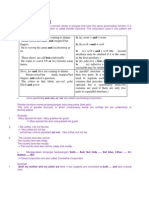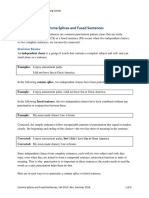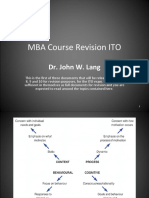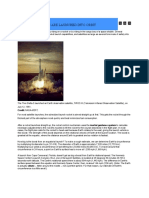Coordinating Conjunctions
Coordinating Conjunctions
Uploaded by
Gwen CaliboCopyright:
Available Formats
Coordinating Conjunctions
Coordinating Conjunctions
Uploaded by
Gwen CaliboOriginal Description:
Copyright
Available Formats
Share this document
Did you find this document useful?
Is this content inappropriate?
Copyright:
Available Formats
Coordinating Conjunctions
Coordinating Conjunctions
Uploaded by
Gwen CaliboCopyright:
Available Formats
Coordinating Conjunctions Gwen and Mymy are sisters.
A conjuction is a word that joins words, phrases, or clauses. There are Nor - combines two or more negative ideas. Neither of the ideas is true or
several types of conjunctions and several other type of words that act as possible.
conjuctions.
e.g. Sarah doesn't like apples, nor does she like pears.
Conjunctions allow you to form complex, elegant sentences and avoid the
choppiness of multiple short sentences. Make sure that the phrases joined Neither Airen or Kj will buy the cake for Aizah's birthday.
by conjunctions are parallel (share the same structure).
But - connects two or more true but contrasting ideas.
Incorrect:
e.g. All the children wanted to eat pizza, but no one wanted to buy it.
I work quickly and careful.
She looked around, but she couldn't see anything.
Correct:
Or - presents a choice between ideas. Only one of the choices is true or
I work quickly and carefully. possible.
e.g. We could go to a zoo, or we could go to a theme park.
Joining words: You should wait before grabbing one of those tempting but We can wait in line for the movie, or we could eat dinner first.
hot cookies.
Yet - connects two or more ideas that are somewhat contrasting.
Joining phrases: We have to drive across two states and around a lake to
e.g. The weather was cold, yet bright and sunny.
get to Grandmother's house.
Miguel plays football well, yet his favorite sport is tennis.
Joining clauses: Because you didn't do your homework, you will need to
miss recess.
So - shows an effect or result.
Beware - so can also be so that, which is a subordinating conjunction.
Sometimes we say so when we mean so that.
A coordinating conjunction connects words, phrases, or clauses that are
grammatically equal. In other words, the conjunction can join several
e.g. You need to be here on time so we can get to the movie before it
nouns or several phrases or several clauses. The coordinating conjunctions
starts.
are and, but, or, nor, for, so, and yet.
You need to be here on time so that we can get to the movies before it
starts.
Joining nouns: We can have pizza, spaghetti, or lasagna for dinner.
Joining verbs: The puppies in the dog park chased, wrestled, and swam all
*Punctuating Coordinate Conjunctions
afternoon.
Coordinating conjunctions have a comma before them when they join two
Joining adjectives: The forest behind your house seems dark and
independent clauses. (A simple sentence is an independent clause.) Both
mysterious.
clauses must make sense by themselves
Joining phrases: We left on time but arrived late because of the storm.
I know I brought my pencil. I can't find it.
Joining clauses: The dragon refused to eat people for he found them
I know I brought my pencil, but I can't find it.
rather foul tasting.
Each coordinating conjunction connects ideas in a slightly different way.
Often a conjunction is used at the end of a series. That conjunction is
usually preceded by a comma in American English. British English writers
often leave out that "terminal comma" or "serial comma." The conjunction
For - explains a reason or purpose.
can be repeated for an emphatic effect instead of using commas.
e.g. Sam drinks water, for he was thirsty.
I have English, math, and science homework.
He is working here, for he loves this company.
I have English and math and science homework.
And - combines two or more positive ideas.
e.g. I put milk and sugar in my tea.
You might also like
- Subordination: Subordination, Coordination, and PredicationDocument13 pagesSubordination: Subordination, Coordination, and PredicationKrishly RomanosNo ratings yet
- Conjuction SDocument30 pagesConjuction SEdher Quintanar100% (1)
- English5 Idea Le Q2 Week 3Document5 pagesEnglish5 Idea Le Q2 Week 3juvy rizanNo ratings yet
- La Project Conjunction 8cDocument21 pagesLa Project Conjunction 8capi-214995726100% (1)
- Conjuction SDocument34 pagesConjuction SsandycamiNo ratings yet
- Clauses Dependent and Independent: ConjunctionsDocument8 pagesClauses Dependent and Independent: ConjunctionsJaveelyn MataroNo ratings yet
- KS2 Grammar and Punctuation Latest UpdatedDocument7 pagesKS2 Grammar and Punctuation Latest UpdatedNorsakinah AhmadNo ratings yet
- Strategic Intervention Materials Strategic Intervention MaterialsDocument27 pagesStrategic Intervention Materials Strategic Intervention MaterialsMae PalaciNo ratings yet
- Hieu U3 TheoryDocument4 pagesHieu U3 TheoryTrung Hiếu Phạm ĐìnhNo ratings yet
- Engl111 Reviewer MidtermDocument8 pagesEngl111 Reviewer MidtermJessa Vel FloresNo ratings yet
- Coordinating ConjunctionsDocument18 pagesCoordinating ConjunctionsDivine CastañedaNo ratings yet
- Conjunction's: Conjunction Are Words Used To Link Words, Phrases or Clauses. Some Common Conjunction Are, &Document18 pagesConjunction's: Conjunction Are Words Used To Link Words, Phrases or Clauses. Some Common Conjunction Are, &Chekahay ni 'Cher Ojie ug 'Cher Alven DiazNo ratings yet
- Conjunctive Adverbs Can Be Grouped According To FunctionDocument2 pagesConjunctive Adverbs Can Be Grouped According To Functiont3xxa100% (1)
- English Reviewer MidtDocument7 pagesEnglish Reviewer Midt24100128No ratings yet
- Task 1: A Rebus Is A Representation of A Name / Word / Phrase Using PicturesDocument24 pagesTask 1: A Rebus Is A Representation of A Name / Word / Phrase Using PicturesChique LabuguenNo ratings yet
- Sentence Connectors and Transitions Rev. S2012Document4 pagesSentence Connectors and Transitions Rev. S2012Astrid CastilloNo ratings yet
- Parallel StructureDocument4 pagesParallel StructureZen ZarkasihNo ratings yet
- Sentence StudyDocument24 pagesSentence StudySorat AbdulsataNo ratings yet
- Onjunctions: Irma Riyani, PH.DDocument25 pagesOnjunctions: Irma Riyani, PH.DZuMa 15No ratings yet
- Coordinating ConjunctionsDocument7 pagesCoordinating ConjunctionsDhittaNo ratings yet
- Sentences: Compound, Complex, Compound-ComplexDocument38 pagesSentences: Compound, Complex, Compound-ComplexSteven Camacho Araya100% (1)
- Conjunctions and ConnectorsDocument9 pagesConjunctions and ConnectorsBạch Quang ĐinhNo ratings yet
- Connecting Words and Transition SignalsDocument6 pagesConnecting Words and Transition Signalsnoorttv5No ratings yet
- 11 ConjunctionsDocument21 pages11 ConjunctionsMus'ab AlduqqahNo ratings yet
- EnglishDocument1 pageEnglishabe getachewNo ratings yet
- Nouns, Adjectives, Verbs and Adverbs (Parts of Speech/ Word Class)Document6 pagesNouns, Adjectives, Verbs and Adverbs (Parts of Speech/ Word Class)सुशील कुमार कुशवाहाNo ratings yet
- Connecting Words in IELTSDocument7 pagesConnecting Words in IELTSGreen GreenNo ratings yet
- EnglishDocument1 pageEnglishabe getachewNo ratings yet
- RPT in EnglishDocument29 pagesRPT in EnglishJanila LopezNo ratings yet
- ADVERBS, PREPOSITIONS, and CONJUNCTIONSDocument6 pagesADVERBS, PREPOSITIONS, and CONJUNCTIONSJessa Mae SusonNo ratings yet
- Free Writing: What Goals and Aspirations Do You Hope To Fulfill in The Next Year?Document19 pagesFree Writing: What Goals and Aspirations Do You Hope To Fulfill in The Next Year?Santhosh NaveenNo ratings yet
- Conjucntion Group 6Document11 pagesConjucntion Group 6PAUL JUSTEIN SIA GRUEZO100% (1)
- Short Pencil Thin Pencil Blue Pencil Soft PencilDocument31 pagesShort Pencil Thin Pencil Blue Pencil Soft PencilJhonel Mogueis Dela CruzNo ratings yet
- Compound SentenceDocument21 pagesCompound SentenceDwi Andayani100% (2)
- ConjunctionDocument5 pagesConjunctionErikaCrisologoNo ratings yet
- Conjunction, Preposition and InterjectionDocument10 pagesConjunction, Preposition and InterjectionmeisyaNo ratings yet
- ConjuctionDocument12 pagesConjuctionSantiNo ratings yet
- Conjunctions Group 4Document57 pagesConjunctions Group 4le6107661No ratings yet
- ConnectorsDocument30 pagesConnectorsclaire jaramillaNo ratings yet
- Hello, Good Morning!: Shiela Ann S. GarciaDocument59 pagesHello, Good Morning!: Shiela Ann S. GarciaJay-Ar LagmanNo ratings yet
- ConjunctionDocument9 pagesConjunctionprz5gk8d96No ratings yet
- He Is A Hardworking Man. He Saved A Lot of MoneyDocument13 pagesHe Is A Hardworking Man. He Saved A Lot of MoneyRecana AlietoNo ratings yet
- Unit III-English PreintermediateDocument4 pagesUnit III-English PreintermediateSlayer2024100% (1)
- English 8-Using Cohesive Devices-Part 1Document56 pagesEnglish 8-Using Cohesive Devices-Part 199wd7jsf5vNo ratings yet
- 03 ENG - SENT - BUILDER-Coordinators & Correlative ConjDocument6 pages03 ENG - SENT - BUILDER-Coordinators & Correlative ConjabncNo ratings yet
- Recongnize ConjuntionsDocument5 pagesRecongnize ConjuntionsRubab Fiaz 152-FMS/BBA-2Y/F22No ratings yet
- Engl111 MidtermsDocument5 pagesEngl111 MidtermsPatricia ParicoNo ratings yet
- SOE prt2Document16 pagesSOE prt2Veronica Cañamo LaranjoNo ratings yet
- Comma Splices and Fused SentencesDocument5 pagesComma Splices and Fused Sentencesayeshazeeshu123No ratings yet
- Topic:5 Parts of SpeechDocument25 pagesTopic:5 Parts of SpeechVIMAL NAIR SURESHNo ratings yet
- Grammar NoteDocument4 pagesGrammar Notechrisfung93No ratings yet
- What You Need To Know About ConjunctionsDocument8 pagesWhat You Need To Know About ConjunctionsHaris MarsaolyNo ratings yet
- We Will Proofread Sentences For The Correct Use Of: SemicolonsDocument20 pagesWe Will Proofread Sentences For The Correct Use Of: SemicolonsMARK JAYNo ratings yet
- Year 3 Grammar Guide: For Children and ParentsDocument6 pagesYear 3 Grammar Guide: For Children and ParentsMarkNo ratings yet
- HE Oordinating Onjunction: Recognize A Coordinating Conjunction When You Find OneDocument6 pagesHE Oordinating Onjunction: Recognize A Coordinating Conjunction When You Find OneAhmedNo ratings yet
- Three Ways For Co Ordination in Compound Sentences Slide DeckDocument40 pagesThree Ways For Co Ordination in Compound Sentences Slide Deckearths-bloom-04No ratings yet
- Q3 Coordinating-ConjunctionsDocument21 pagesQ3 Coordinating-ConjunctionsXiouxsie Lynn CalicdanNo ratings yet
- Functional English Session 10-ConjunctionsDocument35 pagesFunctional English Session 10-Conjunctionsasdf34No ratings yet
- Mata Kuliah: English Grammar Semester/Kelas: 4/pagi Dan Sore SKS: 2 Pertemuan: 3 Topik: Review Basic Grammar Part 2Document14 pagesMata Kuliah: English Grammar Semester/Kelas: 4/pagi Dan Sore SKS: 2 Pertemuan: 3 Topik: Review Basic Grammar Part 2Wahyuni. afNo ratings yet
- 1913-E-Uster Jossi Vision Shield 2 Final Web LowresDocument9 pages1913-E-Uster Jossi Vision Shield 2 Final Web Lowressamskauser.austNo ratings yet
- Maths 4c and 4D From TextbookDocument2 pagesMaths 4c and 4D From TextbookSaberLazarNo ratings yet
- Esplana SteelDesign2Document1 pageEsplana SteelDesign2Naigell SolomonNo ratings yet
- Ucsp ExamDocument4 pagesUcsp ExamNikki CadiaoNo ratings yet
- Sistemas de Acionamento ElétricoDocument153 pagesSistemas de Acionamento ElétricoSergio Lima (serginhofran)No ratings yet
- Cultural Translation and Music A TheoretDocument230 pagesCultural Translation and Music A TheoretMahery RATSIANDAVANANo ratings yet
- Word List Letter CDocument2 pagesWord List Letter CDani AndhikaNo ratings yet
- 1 SyllabusforIntroductiontoFractionalCalculus - 000Document2 pages1 SyllabusforIntroductiontoFractionalCalculus - 000Shorouk Al- IssaNo ratings yet
- 3.1 Gender of The RespondentsDocument12 pages3.1 Gender of The Respondentsshemali akterNo ratings yet
- Name: - Grade & Section: - Date: - Topic: Introduction To Life Science Learning CompetenciesDocument7 pagesName: - Grade & Section: - Date: - Topic: Introduction To Life Science Learning Competenciesjanice alquizarNo ratings yet
- MBA Course Revision ITO: Dr. John W. LangDocument43 pagesMBA Course Revision ITO: Dr. John W. LangDharmesh PrajapatiNo ratings yet
- How Satellites Are Launched Into OrbitDocument3 pagesHow Satellites Are Launched Into OrbitLawrence CuneazNo ratings yet
- Structure and Function of Joints PDFDocument53 pagesStructure and Function of Joints PDFABHAY KUMARNo ratings yet
- Customer-Based Equity and Brand PositioningDocument39 pagesCustomer-Based Equity and Brand PositioningLalit TankNo ratings yet
- Curcumin LaunchDocument10 pagesCurcumin LaunchShouvik DasNo ratings yet
- Data Mahasiswa Briefing Proposal Paper Semester Genap 2023 P1Document24 pagesData Mahasiswa Briefing Proposal Paper Semester Genap 2023 P1Galih PutraNo ratings yet
- Equipo de Bombeo Ejercicio MáquinasDocument4 pagesEquipo de Bombeo Ejercicio MáquinasLP drummerNo ratings yet
- 3S Company ProfileDocument34 pages3S Company ProfileDanny P. UtomoNo ratings yet
- Siemens Sivacon S8Document42 pagesSiemens Sivacon S8Mohamed NasrNo ratings yet
- Section 8.0: Design of A Back Loaded Exponential HornDocument53 pagesSection 8.0: Design of A Back Loaded Exponential Horndfirmo4925No ratings yet
- Abstract of Retaining Wall & Bathing Ghat To Protect Ramraja Temple From Flood Protection of Angori River at Bhagor VillageDocument4 pagesAbstract of Retaining Wall & Bathing Ghat To Protect Ramraja Temple From Flood Protection of Angori River at Bhagor VillageankitNo ratings yet
- Activity 5-Cac, Jessa Mae A,-StsDocument2 pagesActivity 5-Cac, Jessa Mae A,-StsJessa Mae CacNo ratings yet
- ManualDocument13 pagesManualNazar KhanNo ratings yet
- Lesson Plan in Mathematics VIDocument8 pagesLesson Plan in Mathematics VIMarie ChrisNo ratings yet
- W01 Introduction Assignment: InstructionsDocument3 pagesW01 Introduction Assignment: InstructionsodethNo ratings yet
- Philo Study GuideDocument3 pagesPhilo Study GuidesesconnicoleNo ratings yet
- Journal 5cd1743c69584 PDFDocument14 pagesJournal 5cd1743c69584 PDFMis A MilliNo ratings yet
- Lamp Uv 30 WDocument2 pagesLamp Uv 30 WFernando OliveiraNo ratings yet
- 221119-Lafvin ProductDocument18 pages221119-Lafvin ProductRemy MendozaNo ratings yet
- 2019 SPM Trial Biology P2 TopicalDocument167 pages2019 SPM Trial Biology P2 TopicalNg Zi QingNo ratings yet

























































































